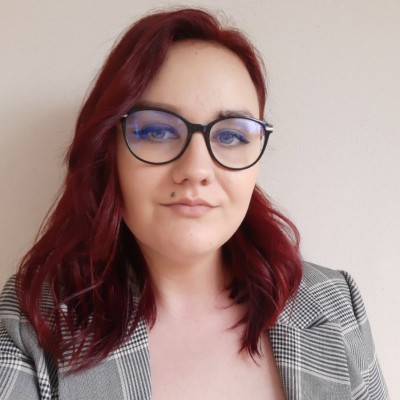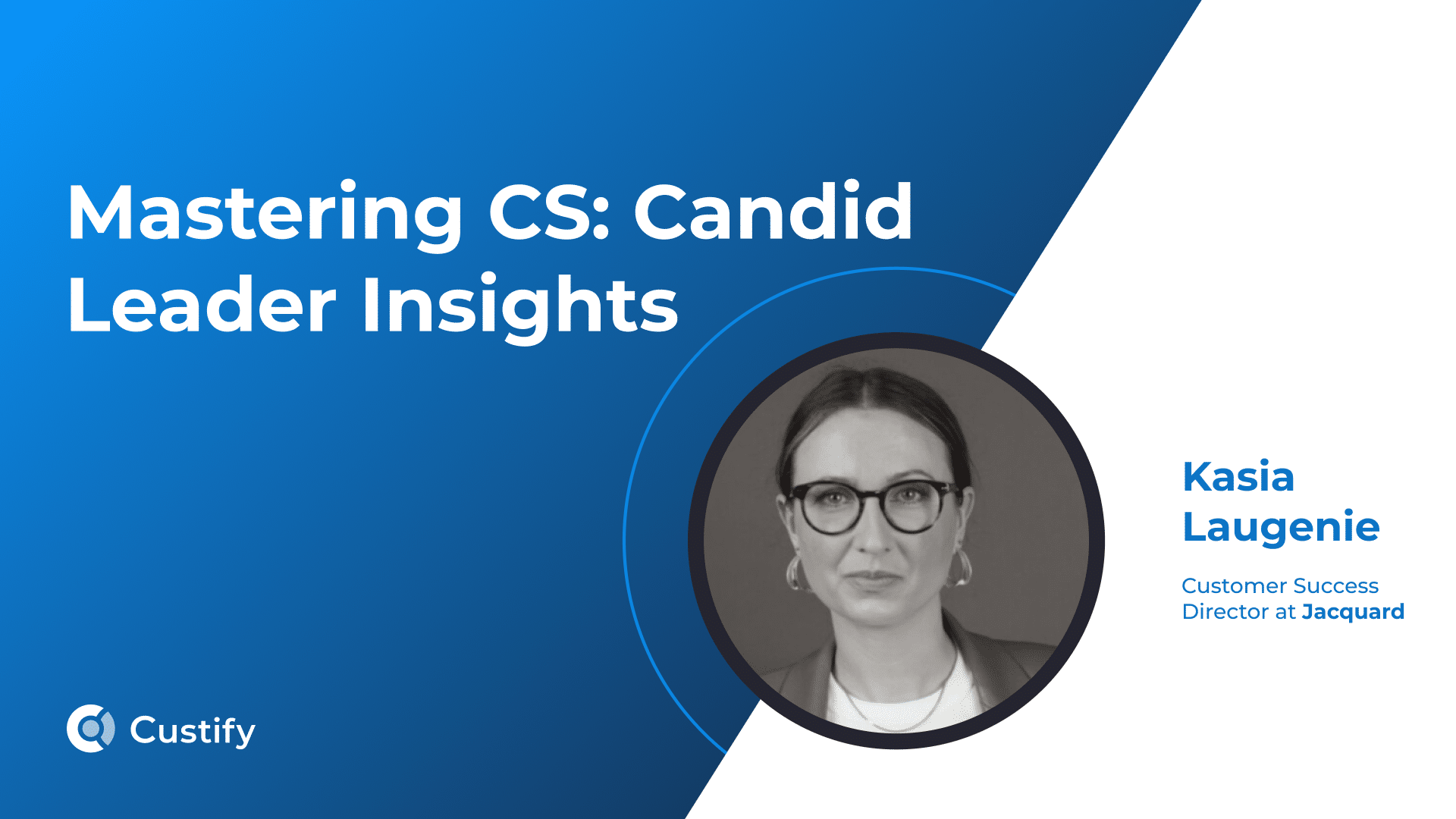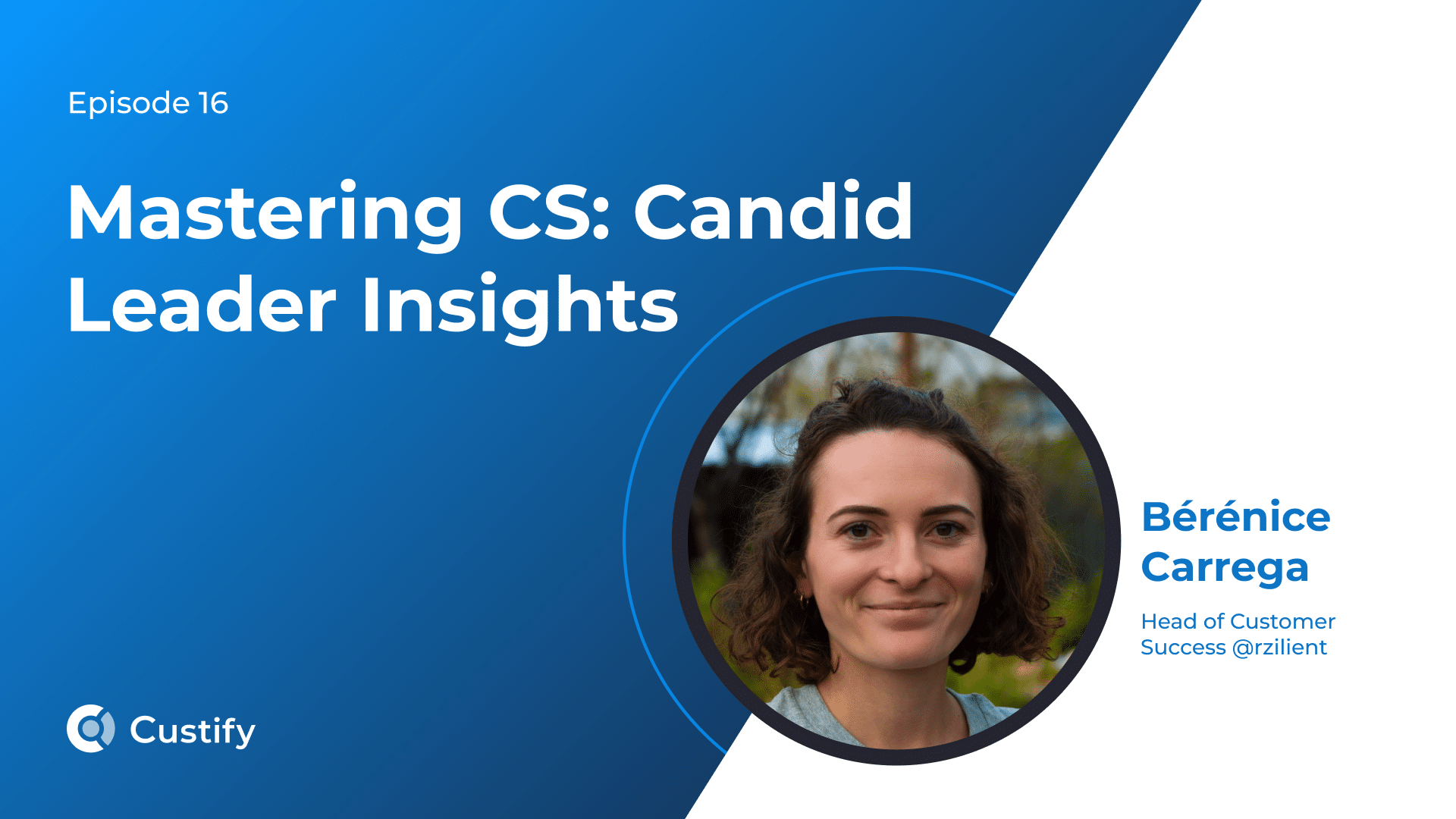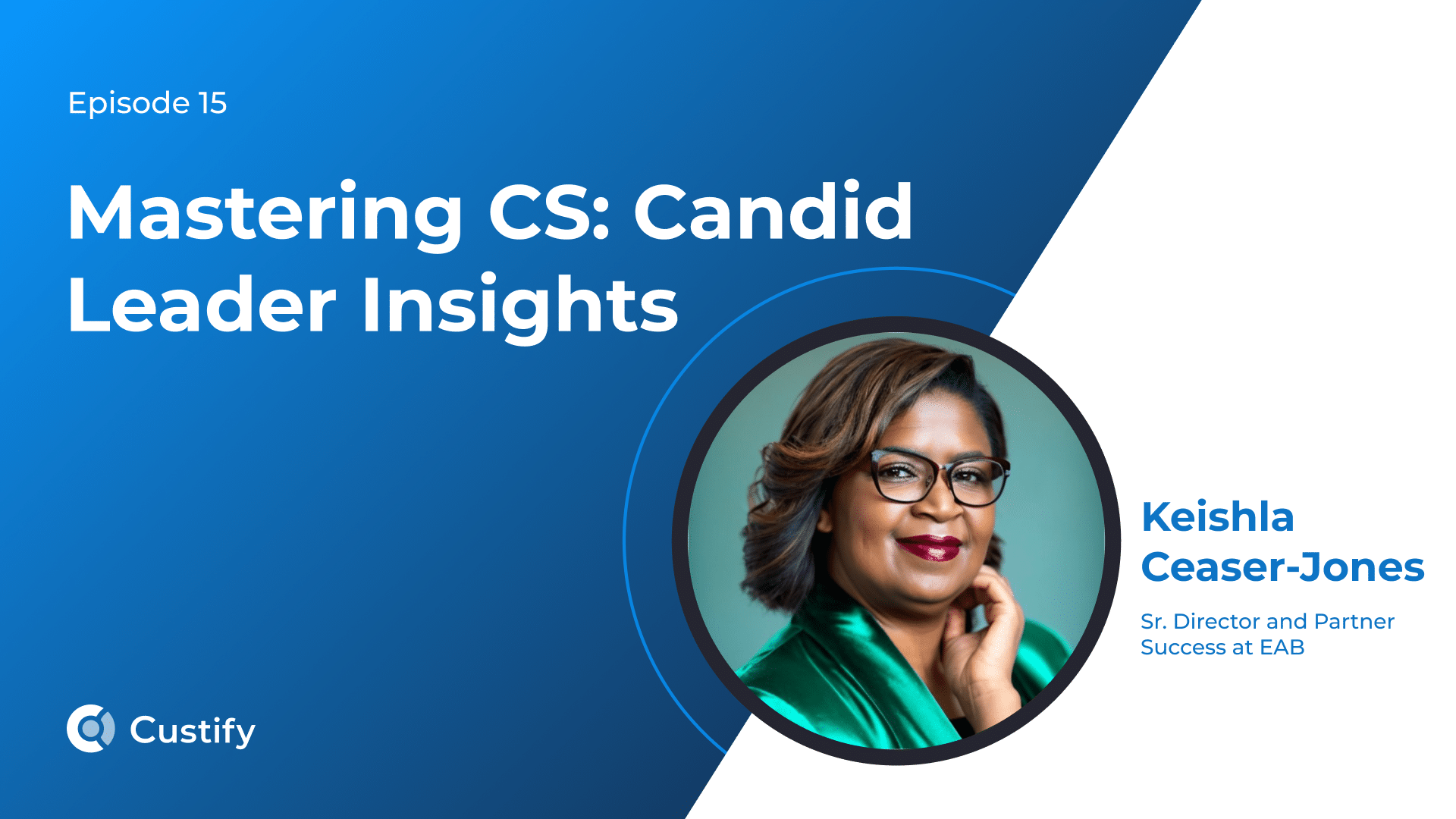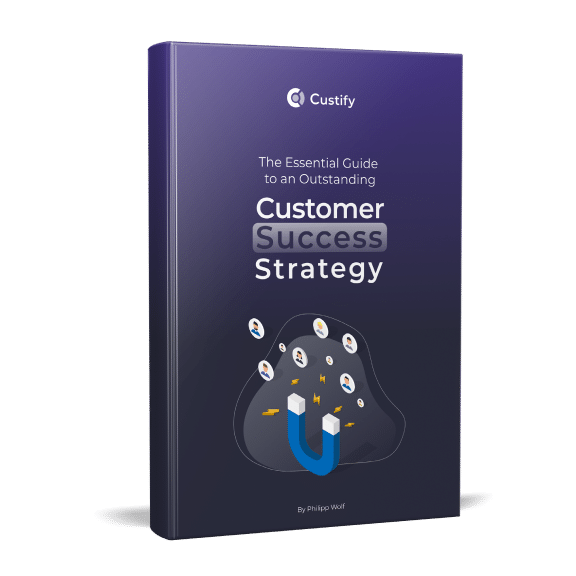Here’s a new episode from our podcast – Mastering CS, Candid Leader Insights. Irina Cismas, Head of Marketing at Custify, sat down with Victoria Fritz, the Head of Customer Success and Support at SocialHub.
In this podcast, Victoria shares amazing insights about her journey in CS, the challenges she overcame, and the strategies she implemented.
What You’ll Learn:
- How to make sure your team is aligned
- How to keep the team united even if you work remotely
- How to maintain a good relationship with sales
- Crucial skills for customer success professionals
- What to prioritize in customer success
- The importance of customer feedback
Key insights and takeaways for CSMs based on the interview:
Customer Focus and Resilience: In customer success, maintaining a positive attitude and focusing on customer needs is crucial. Sharing personal challenges and staying humble can help build a resilient and motivated team.
Importance of Industry Expertise: To deliver maximum value, customer success managers should be industry experts, not just CS process experts. Understanding and speaking the customer’s language is key to addressing their specific challenges effectively.
Alignment Across Teams: Ensuring alignment among all revenue-facing teams, including product, is vital. Despite the inevitable setbacks, maintaining a unified approach towards common goals helps in strategic growth and customer satisfaction.
Strategic KPI Focus: Focusing on one main KPI, such as Net Revenue Retention, and aligning the team around it can drive significant impact. This strategic focus helps the team understand the broader picture and their contribution to the company’s success.
Leveraging the CS Community: The customer success community is a valuable resource. Don’t hesitate to reach out to peers, former colleagues, or connections on LinkedIn for advice and support, as the community is generally very responsive and helpful.
Podcast transcript
Intro
Irina 00:01
Welcome to Mastering CS – Candid Leader Insights, the podcast where we deep dive into the world of customer success with industry leaders. I’m your host, Irina Cismas, and today’s guest is Victoria Fritz, Director of Customer Success and Support at SocialHub.
Victoria, welcome, and thank you for joining me today! Your career path is intriguing. How does someone start as a researcher in biochemistry, move into recruiting for the medical industry, and then transition into customer success? What’s your story? How did you end up working in CS?
Victoria 00:38
Hi, Irina. Thanks for having me. Yeah, CS is actually quite a diverse market, isn’t it? There are people from so many backgrounds who study CS and just kind of end up there. That was exactly my story. I spent some time in academia, did my PhD in biology, doing something completely different. I found out that I was looking for a new direction, something more dynamic, a little bit to do with sales. I didn’t have any idea—I was super young—and I ended up in recruiting, basically for the pharmaceutical industry. I was doing the job on the other side and, through this deeper understanding of the HR industry and consulting, I was headhunted by LinkedIn at that time and ended up in CS.
I wasn’t sure what CS was back in 2015. I wasn’t sure if it was a sales role, a consultancy, or some kind of weird type of consultancy. It was all brand new, and customer success wasn’t even a job title. Each time, you needed to explain what you were doing. Some years down the line, we are here. I think almost everyone who has something to do with software now knows what CS is. It’s super fun to see this development.
Irina 01:55
How did the research role and academic background that you have help you in the CS position? What were the skills formed in previous roles that you felt really made a difference when you joined as a CS?
Victoria 02:14
I think this analytical mindset helps you step out a little bit from daily tasks and small ups and downs, and look at the bigger picture. It’s about asking the right questions. The main differentiator in strategic sales is really understanding the customer’s problem. What is actually their problem? What are they trying to achieve? It’s very helpful to be less emotional, more data-driven, and more analytical. You learn that sometimes the hard way, by doing research. So that’s definitely really helpful.
A typical day for a Director of CS
Irina 02:52
What was your typical day for you as director of CS at SocialHub? What’s on your plate?
Victoria 02:58
Yeah, I think maybe I’ll explain a little bit about how our organization works. Social Hub is around 100 people strong at the moment. We serve the DACH region and France with our social media software. This is our market. We have a 360-degree CS approach. The main CS roles are upselling, cross-selling, onboarding, and typical CS consultancy. I also have a support team who reacts to customer questions and issues via phone or email.
The product part of this role is very new, just a couple of months old. I’m acting as a person who aligns three teams. We found that the current situation is tough and getting tougher due to competition. The market has changed, and we need to ensure we align all teams to deliver value to the customer in the best possible way.
What’s on my plate is very different. I’m sometimes very hands-on, jumping into customer escalations. Sometimes it’s very strategic, working with leadership on the next steps as a company, and also looking at the bigger picture—customer health scores, development, evaluating the tools we’re using, and assessing initiatives. It ranges from very operational to very strategic.
Roles within the customer success team
Irina 04:18
You partially answered my next questions because you mentioned the CS support and product. I know that to excel in the CS role, you need all those types of skills. But I’m curious, how is your team set up? Who do you report to? And most importantly, what are you reporting on? Speaking about strategic alliances, how do you ensure alignment between the teams? But first, let’s start with the roles within your team.
Victoria 04:55
Yeah, so I think we still have a very lean setup; we’re not a big corporation. We’re more of an SMB company. My direct report is to the CRO, who reports to the CEO of the company. In our case, the CEO is very involved in the product. We found it’s very important in our market to ensure the entire leadership team is hands-on with the customer and the product. My role is essentially team alignment.
My core team consists of customer success managers, senior CSMs, and customer support agents, with kind of dotted lines to product managers. I work with product managers to ensure they conceptualize features in the best possible way to serve our customers. So, my role is like sitting on three chairs. I have proactive folks dealing with customers in CS and CRCS, reactive folks handling customer queries in support, and I talk to product managers about how we deliver value to the customer. We make sure we don’t just deliver features for the sake of it, but we stay very close to our customers’ needs.
Essential KPIs
Irina 06:07
And what are the KPIs that are most important, that you are monitoring on a monthly basis?
Victoria 06:15
So I monitor a lot of KPIs, like everyone nowadays. We look at a thousand different numbers. Part of my job involves looking at the financial side of things, like ensuring we are getting money into our bank account. But the strategic part is looking at net revenue retention. It’s our main North Star KPI—how our customers are growing, whether we are upselling, and if we are preventing churn in a way that allows us to grow through existing business. Even if we’re not closing many new deals, we should still be able to grow through our existing customers. This is the main KPI we discuss with all three teams.
Obviously, each team has its own KPIs. You can’t compare product KPIs with support KPIs. In support, we look at the first reply time. In product, we look at sprint deliveries and similar metrics. In CS, we look at individual upselling and churn prevention KPIs. But the main North Star is net revenue retention. The financial part of the role, like checking how efficiently we set out bills and similar tasks, is more operational than a strategic KPI.
The importance of customer feedback
Irina 07:27
Because you also have a dotted line with a strategic alliance on the product side, how important is customer feedback? How does customer feedback influence the product roadmap, and how do you ensure you maintain the product vision while accommodating customer feedback?
Victoria 07:56
I think this is the most important question in SaaS, isn’t it? How do we ensure we remain scalable while also accommodating customer feedback? The answer is actually very complex.
To break it down a bit, we segment our customers first. Obviously, we can’t say yes to everything. We identify our ideal customer profile (ICP) and look at each customer’s situation to see if they fit our ICP. Then we collect all issues and feedback and score them to accommodate them in our roadmap. We don’t say yes to everything, but we also don’t dismiss feedback from smaller customers. It’s important to recognize that big corporations and SMB companies may have different needs, but an SMB company can still have valuable use cases for us.
We use Productboard as a tool to collect all the feedback. The product team uses a scoring system to evaluate the feedback, and we enable CS and support to bring all this information to the product team. This doesn’t mean we say yes to everything, but it means we evaluate things on a feature-by-feature basis. Sometimes it’s more customer-led, and sometimes we need to stay focused on our product vision.
A good example is the old saying about faster horses versus building a car. Customers might want faster horses, but a car actually solves their problem better. It’s a balance. Having a central tool where all the teams are aligned is helpful, and we are still small enough to be flexible and look at what features we can adapt.
Relationship with Sales
Irina 10:02
You mentioned that you are influencing the CS, the support, and also the product. What’s your relationship with sales?
Victoria 10:13
I think we like it. There is always some tension between sales and CS because CS receives part of these issues. We’re just taking the deals that come in. A crucial part is that we have two very strategic teams. The sales team is also looking at long-term situations with customers. We definitely ping-pong situations, saying, “Hey, this one is good,” or “This one maybe not so much.” It’s an area where we can still improve; it’s never perfect. It’s still a give-and-take relationship.
For most CS folks, we are also in sales, just a different kind. It helps if you have an organization where sales and CS are separate. It can be trickier, but for us, we have a common understanding. We all care about revenue and face the same challenges, like hitting our numbers and staying strong. That helps with alignment. However, this is not something we’ve completely solved as a company. We definitely could do better. It’s about being open to what’s on the other person’s plate and understanding how they’re measured. Our relationship is good, but are we perfect? No, not at all. We definitely can do more on that end.
Prioritizing what matters in CS
Irina 11:28
How do you make sure that your day-to-day CS work is actually impacting business KPIs and the growth of the business? CS can cover a lot of things, and it’s easy to end up burned out or busy without working on what actually moves the needle. I’m curious, what’s your secret recipe for making sure you’re working on things that matter?
Victoria 11:58
I can totally relate to what you’re saying. Sometimes, if CS goes in a super strategic or consultancy direction, you can lose ground. What I tell my team is that our existing customers pay our salaries. We pay money to all these 100 amazing people because they are doing their job well. Looking at revenue development is the main thing. In every team meeting, we go through opportunities and look at the development of the customers. This helps ground us because we can get carried away with strategic projects, but the basis is wanting to see our customers succeed and grow. This has a direct business impact.
The NRR (Net Revenue Retention) is presented to investors in every C-level meeting. It’s very down-to-earth for us. My advice would be to pick one KPI and report it to the very top. It’s very helpful for the team because then they have an impact on really strategic stuff, not just on some fancy numbers that maybe no investor would care about.
Crucial skills for customer success professionals
Irina 13:14
Remaining on this lens of the team, when you are building your team and hiring, what’s something you absolutely won’t compromise on in terms of skills?
Victoria 13:25
You know what? A positive attitude. In CS, you deal with problems, customers calling and telling you about their issues and situations. In support, you react to customer issues, problems, bugs, release issues, whatever it might be. If you lose this positive attitude and become drawn down by that, it absolutely mirrors to the customer. Being resilient, staying positive, staying hands-on, and getting things done is key to not being burned out by the job.
CS sometimes deals with internal stuff, product stuff, technical stuff, onboarding stuff—whatever you have. Staying grounded, positive, and with a positive outlook is crucial. It’s hard to teach if someone gets down for a day after one bad call. It’s very hard to coach. We also have people with good humor. Having a nice laugh after a tough call saves a lot.
Irina 14:35
How do you test this out in the recruitment process, by the way? These soft skills are harder to test, I would say.
Victoria 14:45
Yeah, a couple of things you can definitely ask. For example, how they dealt with challenges. This is one of my favorite questions: “Give me an example of a recent challenge.” It doesn’t matter if it’s a business challenge or a personal life challenge. I like to hear more about personal life challenges because people open up more and tell you a story rather than just a business case. You can hear in the conversation how they deal with the situation. Are they super stressed and in fight-or-flight mode, or are they relaxed? How are they welcoming you as a hiring manager?
It’s a lot of reading between the lines, but also asking direct questions about dealing with challenges and the downsides of the job. For instance, “How do you recover after a bad customer call?” It’s helpful to see how they respond to these situations.
How to keep the team motivated
Irina 15:34
It’s very hard to keep the team motivated in this situation. CS usually has a lot on their plate and a lot of pressure because they need to deliver the numbers while dealing with customers. Customers are the ones paying our paychecks every month. I think every CSM these days is feeling that pressure. How do you keep the team motivated and together in tough times?
Victoria 16:13
Being transparent, saying, “I’m struggling myself with keeping all these balls in the air,” and acknowledging that I understand what they’re going through. Sharing my own mistakes or failures, like if I forgot something or missed a deadline, and saying, “Look, guys, this is exactly what I was talking about. I’m super bad at prioritizing things.” Being humble, honest, and as transparent as possible, even on a personal level, helps a lot.
If we get caught up in the situation without being able to look at the bigger picture, it’s very tough. So, presenting the bigger picture and saying, “Hey guys, the days are tough, but look how far we’ve come,” helps to relax the tension of the day. We also have a good vibe in the team, which helps a lot. People can have a laugh, chat, and talk about something else to disconnect a bit from daily business. It’s super helpful.
Irina 17:16
Are you guys remote? Where are you in? In the office?
Victoria 17:20
We’re 100% remote, so it’s not a challenge. We need to really find a way through. Yeah, well, WebEx camera, whatever it would be to still be human, to still open up, share stuff.
Mistakes you are proud of
Irina 17:34
You mentioned being transparent and humble and sharing your own mistakes. What’s the biggest one that you’ve made when you joined a new organization, or not necessarily a new organization, but what’s one mistake that you are proud of?
Victoria 17:56
You know what? I underestimated the power of defocus. When I was a new leader, I got caught up in all the strategic initiatives—doing this, doing that, creating a customer health score, focusing on NPS, and getting caught up in all the strategic stuff. What is really important is to keep focusing on the customer. The power of this defocus takes you away from the ground, and you end up making decisions that may not impact the customer.
Whatever I try to do nowadays, no matter what it is or who I’m talking to, I keep the customer first and at the top of my mind. Whether we are implementing a new CRM, discussing a new customer journey tool, or anything else, the focus must be on the customer. Otherwise, you get caught up in all the strategic stuff, and maybe your customer doesn’t care about it. Most probably, they don’t care about it. They want to be served in the best way possible—that’s what they care about.
Tips for landing a job in CS
Irina 18:56
I want to remain on the recruiting part because you were on the other side of the table, so I want to take advantage of the experience you have. I know that a lot of senior CS folks are sitting on the bench looking for their next role. What’s your piece of advice for them? From a recruiter’s perspective, what’s the most important thing when trying to land a new job?
Victoria 19:24
I think, don’t be afraid to step back in one place to step up in another. Of course, some HR positions set certain standards—maybe the product in one position was amazing, or the team in another place was fantastic. However, having the mindset that you want everything perfect in every role is unrealistic. Be honest with yourself and find out what you can compromise on to enable you to take two steps up elsewhere.
For me, it’s crucial as well. I need to compromise on a lot of things sometimes—location, product, or even a bit of the setting—in order to grow. It might not be the most comfortable part of the job search, but it’s a necessary one.
Goals for the Customer Success Team
Irina 20:13
Looking ahead, what’s your main goal for the rest of the year?
Victoria 20:20
To ensure we are serving our customers in tough situations in the best possible way and positioning ourselves in the market to stand out compared to our competitors—that’s the main thing. Very simple.
Irina 20:35
And what do you need in order to make sure that you deliver on this?
Victoria 20:41
Absolute alignment for all revenue-facing folks, and by revenue-facing, I’m including product as well. We all need to be pulling on the same string. We want to ensure we are not demotivated by small setbacks. It’s really a big goal—it’s not something you can achieve in a quarter. It’s a strategic move. This can sometimes feel intangible for the team because it can seem like blah blah blah, but we need to translate this into daily actions.
Resources for people in CS
Irina 21:22
Last question. Do you have any go-to resources for people in customer success? How do you stay updated?
Victoria 21:29
Customer success is super diverse right now. It exists in software and almost every other industry. Make sure you’re not only an expert in CS processes but also an industry expert. For us, it’s social media, but it could be HR, tech, medicine, or anything else. Make sure you maintain this connection, because the most value we deliver to our customers is when we speak their language, understand their challenges, and know what they’re talking about.
In terms of overall CS, there is no sales organization like another, so absorb as much as you can from podcasts, LinkedIn groups, and other resources. There are lots of resources out there. However, ensure you stay connected to your industry because this is the main value for your customers. They don’t care about CS; they care about their industries and their specific needs.
Irina 22:23
Thank you so much for sharing your story and insights with me today. Victoria, it’s been great. Is there anything else you’d like to share with our listeners? Any final thoughts or pieces of advice?
Victoria 22:38
I think just, yeah, we are all in the same boat. Lots of people have challenges. Just reach out to CS folks you know, maybe from your last job, or find someone on LinkedIn, and ask for advice. We have quite a great community. You will get an answer if you ask. So just don’t be afraid to ask.
Irina 22:58
Awesome. Thank you again for joining us, and until next, time on Mastering CS – Candid Leader Insights, keep striving for success in all your customer journeys.
